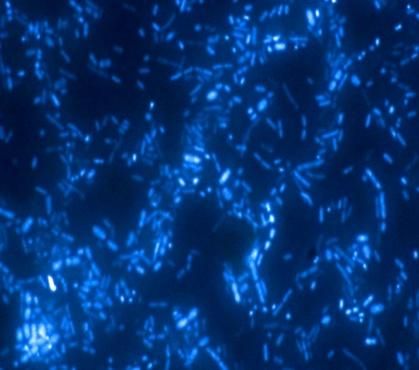What is our microbiota?
All of us have friendly bacteria all over our bodies. A large population of bacteria lives in our gastrointestinal tract, residing mostly in the colon (large intestine). This is known as our gut microbiota.
If we were able to count the bacteria on and about our bodies, they would add up to about 100 trillion, or 100,000,000,000,000. Although the number varies, we may have more than 10 times more bacterial cells on us than the human cells that make up our bodies! If we could weigh all the bacteria in our colon, it would amount to about 2 or 3 pounds (Dahl et al. 2009).
What does our microbiota do for us?
Our microbiota helps defend against disease—collectively, these resident bacteria help to develop and maintain our immune system's defenses against illness introduced by less friendly, disease-causing bacteria. The bacteria of our microbiota can also make vitamins, such as vitamin K.
The bacteria in our colon break down food residue that escapes digestion in our small intestine. For example, some of the starch and protein we eat, as well as all of the fiber in our foods, is not digested and ends up in our colon. The bacteria in the colon break down the food residue for energy and growth. This process is known as fermentation.

Credit: UF/IFAS Department of Microbiology and Cell Science and the Emerging Pathogens Institute
We benefit from the fermentation of fiber and starch. However, the fermentation of undigested protein as a result of high intakes of meat is much less favorable (Macfarlane and Macfarlane 2011). Fermentation provides us with some energy (calories) and also helps to keep the colon healthy.
Can microbiota cause disease?
Our microbiota is thought to remain somewhat stable in adulthood. However, the balance of bacteria in our gastrointestinal tract may be disturbed by changes in diet, contaminated food and water, stress, antibiotics, and aging. Inflammatory bowel disease (IBD), most forms of diarrhea, and many other diseases and conditions are linked to changes in our gut microbiota (Goulet 2015). Our gut microbiota may also be related to our health beyond the gut. Research is being carried out to explore possible connections between microbiota and many diseases and conditions.
What is a prebiotic?
A prebiotic is a specific "food" for beneficial bacteria in the gut. By definition, a prebiotic is a "substrate that is selectively utilized by host microorganisms conferring a health benefit" (Gibson et al. 2017). Prebiotics are found in high amounts in breast milk and work to optimize the numbers of beneficial bacteria in the baby's intestine. Prebiotic fibers are also found naturally in wheat, onions, chicory root, Jerusalem artichoke, and beans. The most well-known prebiotic fiber is inulin, also known as chicory root fiber. Chicory root fiber is added to many foods, including snack bars, yogurts, and beverages.
How can we keep our microbiota in balance?
One of the most important things we can do to maintain our normal microbiota is to eat a well-balanced diet. A diet high in fiber from fruits, vegetables, beans, whole grains, and nuts may promote a well-balanced microbiota. Probiotics (good bacteria), taken as capsules or in supplemented foods, also may help maintain or restore microbiota.
Learn More
Related EDIS publications include the following:
- Facts About Fiber: https://edis.ifas.ufl.edu/fy849
- Go with Your Gut: Understanding Probiotics: https://edis.ifas.ufl.edu/fs172
- Various publications on food safety: https://edis.ifas.ufl.edu/topic_food
References
Dahl, W. J., K. E. Hagen, and T. A. Tompkins. 2009. "Human microbiota and the role of probiotics." Agro Food Industry Hi-tech 20: 34–36.
Gibson, G. R., R. Hutkins, M. E. Sanders, S. L. Prescott, R. A. Reimer, S. J. Salminen, K. Scott, C. Stanton, Kelly S. Swanson, P. D. Cani, K. Verbeke, and G. Reid. 2017. "Expert consensus document: The International Scientific Association for Probiotics and Prebiotics (ISAPP) consensus statement on the definition and scope of prebiotics." Nature Reviews Gastroenterology & Hepatology 14 (8): 491–502. https://doi.org/10.1038/nrgastro.2017.75
Goulet, O. 2015. "Potential role of the intestinal microbiota in programming health and disease." Nutrition Reviews 73 (Suppl) 1: 32–40. https://doi.org/10.1093/nutrit/nuv039
Macfarlane, G. T., and S. Macfarlane. 2011. "Fermentation in the human large intestine: Its physiologic consequences and the potential contribution of prebiotics." J Clin Gastroenterol 45: S120–7. https://doi.org/10.1097/MCG.0b013e31822fecfe